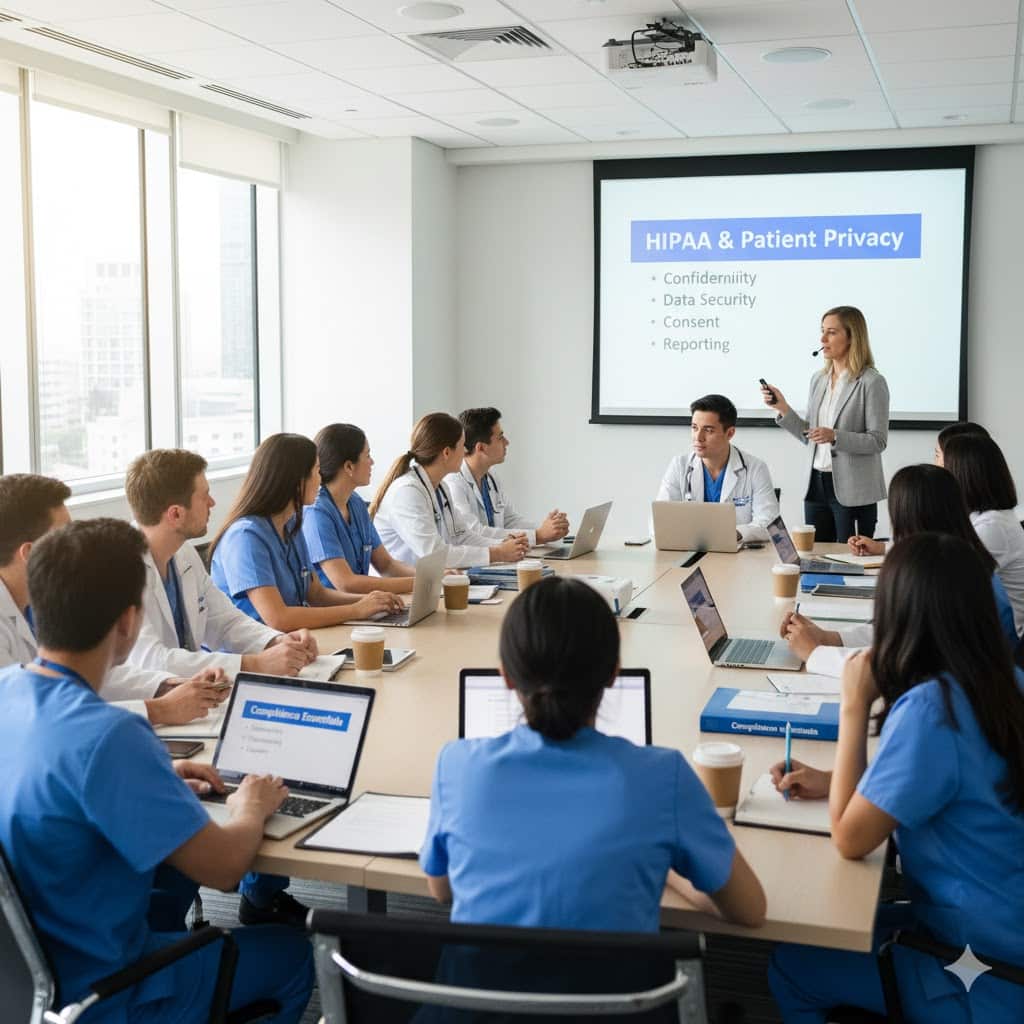Interns are the lifeblood of the healthcare industry, bringing fresh energy, new ideas, and a passion for learning. However, their integration into a complex healthcare environment comes with a significant responsibility: ensuring they understand and adhere to strict compliance regulations from day one.
Effective compliance training for interns isn’t just a bureaucratic checkbox; it’s a critical investment in patient safety, data security, and your organization’s reputation. A well-trained intern becomes a valuable, confident team member, while an untrained one can pose a serious risk.
This comprehensive guide breaks down the essential components of a robust compliance training program for interns at any healthcare provider.
Why is Compliance Training Non-Negotiable for Healthcare Interns?
Before diving into the “what,” it’s crucial to understand the “why.” Healthcare interns, regardless of their role (clinical, administrative, or IT), are exposed to sensitive information and complex situations. Compliance training is essential because it:
-
Protects Patient Safety: Proper training on protocols directly prevents medical errors and ensures quality care.
-
Safeguards Patient Privacy: Interns must understand the gravity of handling Protected Health Information (PHI) to avoid devastating data breaches.
-
Mitigates Organizational Risk: A single compliance misstep by an uninformed intern can lead to massive fines, lawsuits, and reputational damage for the entire institution.
-
Fosters a Culture of Compliance: Early training instills an ethical, responsible mindset that interns will carry throughout their careers.
-
Ensures Regulatory Compliance: It meets the mandatory requirements set by federal and state laws.
Core Components of an Effective Intern Compliance Training Program
A one-size-fits-all approach doesn’t work in healthcare compliance. Your training program should be comprehensive, engaging, and tailored to the intern’s specific department. Here are the pillars every program must include:
1. HIPAA (Health Insurance Portability and Accountability Act) Training
This is the cornerstone of healthcare compliance. HIPAA training for interns must be thorough and practical.
-
Understanding PHI: What constitutes Protected Health Information? It’s not just medical records—it’s names, addresses, billing information, and even photos.
-
The Minimum Necessary Standard: Interns should only access the PHI essential to perform their specific duties.
-
Permitted Uses and Disclosures: When is it okay to share PHI? Cover treatment, payment, healthcare operations (TPO), and situations requiring patient authorization.
-
Safeguarding PHI: Practical steps on creating strong passwords, securing workstations, avoiding discussions in public areas, and properly disposing of sensitive documents.
-
Breach Notification: What constitutes a breach, and what is the immediate protocol if one is suspected?
2. OSHA (Occupational Safety and Health Administration) & Infection Control
Protecting interns is just as important as protecting patients. This training ensures a safe working environment.
-
Bloodborne Pathogens Standard: Education on HIV, HBV, and HCV, and the proper use of Personal Protective Equipment (PPE) like gloves and gowns.
-
Sharps Safety: Safe handling and disposal of needles and other sharp instruments to prevent needlestick injuries.
-
Hand Hygiene and Standard Precautions: The first line of defense against healthcare-associated infections (HAIs).
-
Emergency Procedures: Location of emergency exits, fire extinguishers, and the steps to take during a fire or other disaster.
-
Hazard Communication: Understanding the labeling of hazardous chemicals and the availability of Safety Data Sheets (SDS).
3. Ethics and Professional Conduct
Compliance goes beyond legal rules; it’s about building trust.
-
Conflicts of Interest: Identifying and avoiding situations where personal interests could conflict with professional duties.
-
Professional Boundaries: Maintaining appropriate relationships with patients, families, and colleagues.
-
Cultural Competency and Sensitivity: Providing respectful care that is responsive to diverse cultural backgrounds, beliefs, and languages.
-
Reporting Responsibilities: Creating a safe environment for interns to report unethical behavior, compliance concerns, or safety issues without fear of retaliation.
4. General Safety and Emergency Preparedness
Interns should feel prepared for any situation.
-
Basic Life Support (BLS): While often a prerequisite, ensuring all interns are certified in CPR and AED use is vital.
-
Incident Reporting: The clear process for reporting any accident, error, or unusual event.
-
Emergency Codes: Familiarity with the facility’s color-coded or numbered emergency alert system (e.g., Code Blue, Code Red).
Best Practices for Implementing Your Training Program
Creating the content is only half the battle. Effective implementation is key to success.
-
Start on Day One: Integrate compliance into the very first day of orientation. It sets the right tone.
-
Make it Engaging: Move beyond monotonous slide decks. Use real-world scenarios, interactive quizzes, videos, and case studies that interns can relate to.
-
Role-Specific Training: A medical intern needs deep clinical training, while a IT intern needs focused training on network security and EHR access logs. Tailor the content.
-
Utilize a Learning Management System (LMS): An LMS like the one offered by HIPAA Training Network allows you to track progress, administer tests, and ensure every intern has completed their mandatory modules.
-
Foster Mentorship: Pair interns with experienced staff members who can model compliant behavior and answer day-to-day questions.
-
Provide Continuous Learning: Compliance isn’t a one-time event. Offer refresher courses and updates on changing regulations throughout the internship.
Conclusion: Building a Foundation for a Compliant Future
Investing in a comprehensive compliance training program for your healthcare interns is an investment in your organization’s future. It empowers them with the knowledge and confidence to contribute effectively while minimizing risk. By building a strong foundation of ethics, safety, and regulatory knowledge, you are not only protecting your patients and your organization but also shaping the next generation of responsible healthcare professionals.
Ready to build or enhance your intern compliance training program? Explore our fully customizable, engaging, and up-to-date training solutions designed specifically for the healthcare environment.
